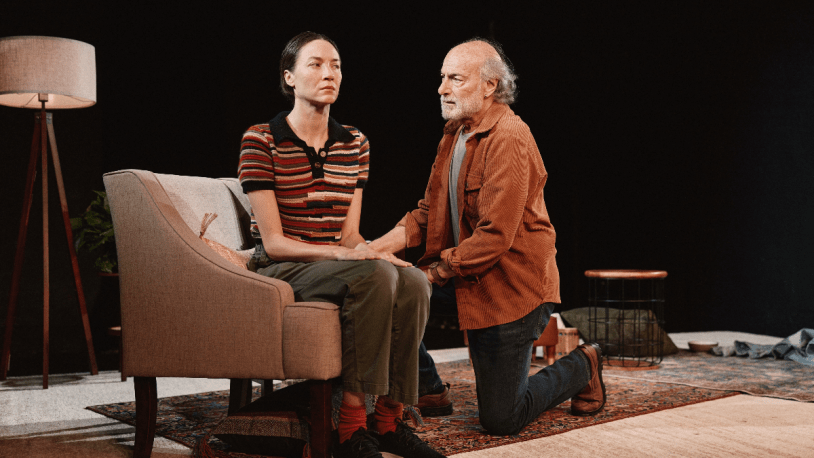There are some individuals who, either by their nature or the nature of their psychiatric condition, seem to be utterly resistant to therapy. The young woman in Max Wolf Friedlich’s explosive new two-hander Job takes that resistance several steps further. (The show opened Monday at Soho Playhouse.) She opens the first session by pointing a gun at the therapist, a sixtysomething man with a hippie-adjacent look played with preternatural calm by Peter Friedman. In a series of rapid-fire scenes lasting only seconds each, we see various scenarios play out, from her remaining frozen to firing at him to turning the weapon on herself. And then, as if the spell has been broken or the adrenaline rush has subsided, we settle into the most awkward therapy session in history.
The woman, a twentysomething full of entitlement and rage and not fully aware of either her illness or her internal contradictions, has clearly been scarred by her years working as a content moderator for a tech giant that’s never named. (She’s also been scarred by earlier traumas, which she shares with a characteristically bitter wit but no self-awareness.) After years of watching violent, disgusting images, she suddenly snapped — producing a viral video that has landed her in this therapist’s office as a condition of reclaiming a job that she treats as a vocation with an almost missionary zeal: “For the first time in my life I have power. Or had.”
Sydney Lemmon is phenomenal as the young woman, identified as Jane in the script, projecting intelligence, sarcasm and solipsism in equal measure — and she sometimes manages to make us forget about the depths of her paranoia (she insists on looking at, and approving, the text that Friedman’s therapist sends to cancel his next patient).
Friedman, meanwhile, matches Lemmon’s performance with a savvy intelligence all his own, engaging this troubled patient while making us ever aware that this is a hostage situation in which the doctor does not hold the upper hand, even if the gun is momentarily tucked away in Jane’s cloth bag. No therapists are trained to handle a session quite like this one, but Friedman projects an outward calm even as he scrambles for ways to defuse a situation that could end his life as well as his career. “We are both people saddled with a calling,” he tells her at one point. “Mine is to care for the young woman here in this room. Not some cog in a corporate machine, not some viral video, but a person who has earned the right to be taken seriously.”
Director Michael Herwitz strikes the right balance in the back-and-forth between the two characters, moving them about the cramped, simply designed set (by Scott Penner) in ways that seem natural. And sound designers Jessie Char and Maxwell Neely-Cohen add elements that amplify our sense of Jane’s disorientation, the episodes where she seems to be drifting out of the reality of the moment.
Over time, Friedman’s character begins to suggest an alternative take on the show’s title: Like the biblical Job, this therapist is subjected to one trial after another, each testing his faith (in therapy) as well as his ability to survive. Somehow, he faces each obstacle patiently and forthrightly — including a final accusation that feels far too rushed for either the characters or the audience to fully process, or weigh the truth of (especially given how Jane has emerged as a thoroughly unreliable a narrator of her own or others’ lives). Despite that stumble, Job is a crackerjack battle of the generations, a smart and nuanced study of two people whose lives are forever changed when they cross paths.

